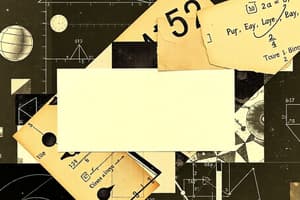Podcast
Questions and Answers
What is mathematics broadly divided into?
What is mathematics broadly divided into?
Pure mathematics and applied mathematics
What does pure mathematics explore?
What does pure mathematics explore?
Mathematical concepts
What do integers and natural numbers represent the beginning of?
What do integers and natural numbers represent the beginning of?
Quantity
What is the field of mathematics that deals with sets and operations that preserve mathematical structure called?
What is the field of mathematics that deals with sets and operations that preserve mathematical structure called?
What is studied in geometry?
What is studied in geometry?
Name one of the central notions in calculus.
Name one of the central notions in calculus.
What are the two branches of calculus?
What are the two branches of calculus?
In mathematical notation, what can superscripts denote?
In mathematical notation, what can superscripts denote?
What is a proof in mathematics?
What is a proof in mathematics?
What is the history of mathematics primarily the history of?
What is the history of mathematics primarily the history of?
Flashcards
What is mathematics?
What is mathematics?
The study of quantity, structure, space, and change.
Pure mathematics
Pure mathematics
Exploring mathematical concepts without considering real-world applications.
Applied mathematics
Applied mathematics
Creating mathematical methods to solve practical problems in science, engineering, and other fields.
Quantity in mathematics
Quantity in mathematics
Signup and view all the flashcards
Algebra
Algebra
Signup and view all the flashcards
Abstract algebra
Abstract algebra
Signup and view all the flashcards
Geometry
Geometry
Signup and view all the flashcards
Calculus: Differential vs. Integral
Calculus: Differential vs. Integral
Signup and view all the flashcards
Mathematical proof
Mathematical proof
Signup and view all the flashcards
Subscripts in math notation
Subscripts in math notation
Signup and view all the flashcards
Study Notes
- Mathematics explores quantity, structure, space, and change.
- Mathematicians and philosophers hold varying views regarding the precise scope and definition of mathematics.
- Mathematics involves the pursuit of patterns and the formulation of conjectures.
- Mathematicians establish the validity of conjectures through mathematical proofs.
- Mathematical reasoning offers insights and predictions about nature when mathematical structures effectively model real-world phenomena.
- Mathematics evolved from activities like counting, calculation, measurement, and the study of physical objects' shapes and motions, employing abstraction and logic.
- Practical mathematics has been a fundamental human activity throughout recorded history.
- Mathematical research is an ongoing endeavor.
Fields of Mathematics
- Mathematics is broadly categorized into pure and applied mathematics.
- Pure mathematics delves into mathematical concepts without considering practical applications.
- Applied mathematics is dedicated to creating mathematical methods for solving problems in science, engineering, and other fields.
- Cryptography exemplifies topics studied for both their pure mathematical interest and practical applications.
Quantity
- Quantity originates with numbers, starting from natural numbers and integers ("whole numbers").
- Integer arithmetic extends to algebra, using letters for variables.
- Algebra focuses on formula rules and equation solving.
Structure
- Mathematical objects such as sets of numbers and functions often demonstrate internal structure due to defined operations or relations.
- Mathematics studies sets alongside structure-preserving operations.
- This area is known as abstract algebra.
- The study of groups, rings, fields, and other abstract systems falls under abstract algebra.
Space
- Geometry is the study of space.
- Trigonometry integrates space and number, utilizing sine, cosine, and tangent functions.
Change
- Calculus was created to investigate change, a recurring theme in the natural sciences.
- The function and the limit are central to calculus.
- Calculus is divided into differential and integral calculus.
- Differential calculus addresses instantaneous rates of change and curve slopes.
- Integral calculus deals with the accumulation of quantities and areas under or between curves.
Mathematical Notation
- Mathematical notation has expanded over centuries.
- Subscripts now indicate the element's position in an array or a function's variable derivation.
- Superscripts signify exponents, index sets, or covariance.
Proof
- Proof is crucial in mathematics.
- Proof involves constructing a logical argument that confirms the truth of a statement within a set of axioms.
- Acceptance of a proof requires completeness and correctness.
History
- The history of mathematics primarily involves the history of new discoveries in mathematics.
- Mathematics was applied to trade, land measurement, painting and weaving patterns, and timekeeping as mathematical knowledge grew.
- The Rhind Mathematical Papyrus is among the ancient mathematical texts discovered.
- New fields emerged as civilizations progressed.
Influence of Mathematics
- Mathematics is vital in natural science, engineering, medicine, finance, and social sciences.
- Applied mathematics has spurred new mathematical disciplines like statistics and game theory.
- Mathematicians pursue pure mathematics for its intrinsic value, independent of applications.
- The significance of mathematics is increasingly recognized in areas beyond the sciences.
Studying That Suits You
Use AI to generate personalized quizzes and flashcards to suit your learning preferences.




